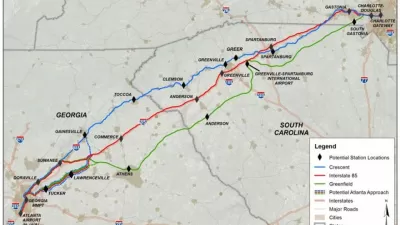Cities outside of the big coastal tech hubs have characteristics well suited for the high-tech sector.

Roy Bahat, Shauntel Garvey, and Nitin Pachisia explore the startup advantages of places other than Silicon Valley and New York — in particular, the Southern cities of Charlotte, Columbia, and Atlanta.
“The cities we visited represent a new breed of challenger to the geographic dominance of venture capital’s leading centers, who — if they can cover the table stakes — bring advantages the Valley may struggle to capture,” they say.
For one, these cities are racially diverse and also have diverse economies. In addition, people in these cities understand what it takes to overcome adversity, a trait that Bahat, Garvey, and Pachisia say is useful in the venture capital world:
If a startup can make it in Orangeburg, SC, a manufacturing town with a median household income of $29k, it can make it anywhere. Many founders in Silicon Valley have had it so good they can no longer smell money. Startups, unlike many other kinds of projects (like learning to play music), simply require the right timing and dosage of adversity.
To foster these markets, they say investors need to engage beyond financial contributions by participating in local events and mentoring and coaching.
Understanding the culture of and institutions important to a particular place is essential as well, with churches being one example. “More than one founder told us about the role The Creator plays in their startup’s creation. Baptist, AME, and Methodist churches have long undergirded economic development in these cities. Startups harness those trusted networks to find teammates and customers,” they note.
FULL STORY: Placing bets beyond the venture hubs of New York and Silicon Valley

Alabama: Trump Terminates Settlements for Black Communities Harmed By Raw Sewage
Trump deemed the landmark civil rights agreement “illegal DEI and environmental justice policy.”

Planetizen Federal Action Tracker
A weekly monitor of how Trump’s orders and actions are impacting planners and planning in America.

Why Should We Subsidize Public Transportation?
Many public transit agencies face financial stress due to rising costs, declining fare revenue, and declining subsidies. Transit advocates must provide a strong business case for increasing public transit funding.

Understanding Road Diets
An explainer from Momentum highlights the advantages of reducing vehicle lanes in favor of more bike, transit, and pedestrian infrastructure.

New California Law Regulates Warehouse Pollution
A new law tightens building and emissions regulations for large distribution warehouses to mitigate air pollution and traffic in surrounding communities.

Phoenix Announces Opening Date for Light Rail Extension
The South Central extension will connect South Phoenix to downtown and other major hubs starting on June 7.
Urban Design for Planners 1: Software Tools
This six-course series explores essential urban design concepts using open source software and equips planners with the tools they need to participate fully in the urban design process.
Planning for Universal Design
Learn the tools for implementing Universal Design in planning regulations.
Caltrans
Smith Gee Studio
Institute for Housing and Urban Development Studies (IHS)
City of Grandview
Harvard GSD Executive Education
Toledo-Lucas County Plan Commissions
Salt Lake City
NYU Wagner Graduate School of Public Service





























